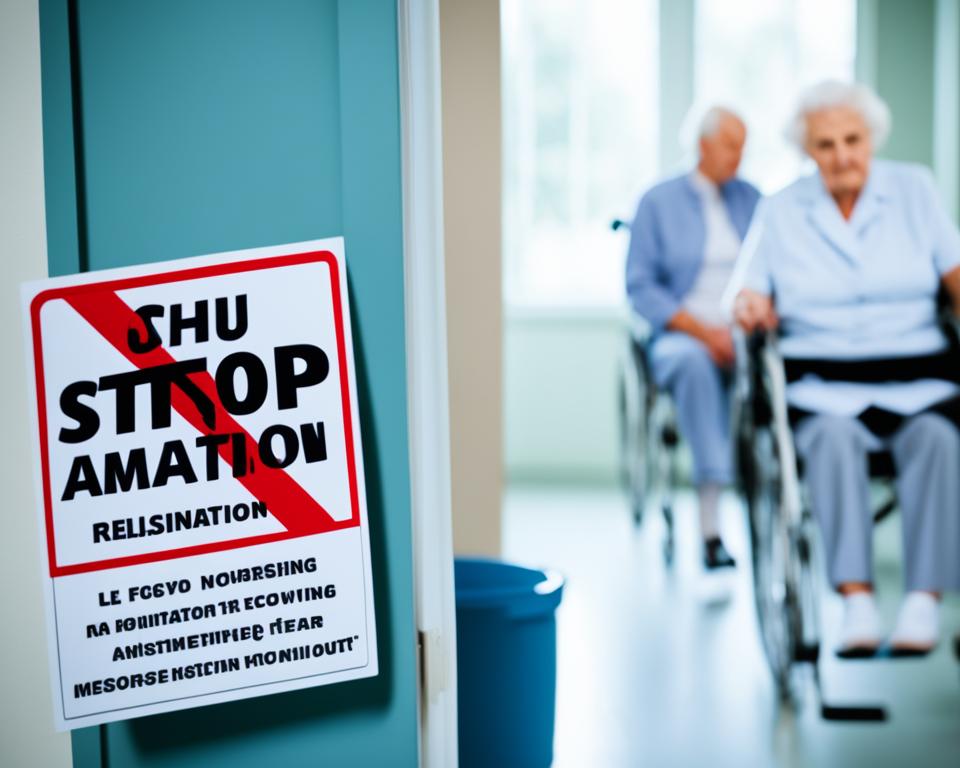When we entrust our loved ones to the care of a nursing home, we expect them to receive the highest level of care and support. However, the reality is that not all nursing homes adhere to the standards we expect. Understanding the regulations in place can help us ensure our loved ones are protected and receive the quality care they deserve.
So, what are the things nursing homes are not allowed to do? As concerned family members, we often wonder about the limits placed on nursing homes and their staff. Can they neglect or abuse residents? Can they retaliate against complaints? Can they force medical care or treatment? Can they discriminate against residents? Can they violate privacy and personal property rights? Let’s delve into these questions and shed light on the important regulations governing nursing homes.
Join me as we explore the five key things nursing homes are not allowed to do, enlightening us on the residents’ rights, the enforcement of nursing home regulations, and the steps we can take to ensure our loved ones receive the care and respect they deserve.
Neglect or Abuse Residents
Nursing homes have a crucial responsibility to provide appropriate care and ensure the safety and well-being of their residents. They are not allowed to neglect or abuse residents in any way. This includes physical, emotional, sexual, and financial abuse. Neglect refers to the failure to provide adequate food, shelter, medical care, personal hygiene assistance, or social interaction. It is an unacceptable breach of trust and can have severe consequences for residents.
Abuse, on the other hand, involves any form of harm inflicted upon residents by nursing home staff or other residents. This can include physical violence, verbal abuse, and financial exploitation. It is essential to create a safe and secure environment that protects residents from any form of abuse or harm.
Violations of these regulations can lead to penalties, fines, or even the closure of the nursing home. The well-being of residents should always be the top priority, and any signs or suspicions of neglect or abuse should be reported immediately. Everyone deserves to live in an environment that promotes dignity, respect, and compassionate care.
When it comes to nursing home abuse and neglect, it is crucial to raise awareness and take proactive steps to prevent and address these issues. By advocating for the rights of nursing home residents, we can work towards ensuring their well-being and improving the overall quality of care in these facilities.
Understanding the Types of Neglect and Abuse
There are various forms of neglect and abuse that nursing home residents may experience. It is essential to be aware of these types to identify and address any signs of mistreatment.
Retaliate Against Complaints
Nursing homes are legally prohibited from retaliating against residents or their families for voicing complaints or expressing concerns. This regulation aims to protect the rights and well-being of nursing home residents.
Retaliation can take various forms, including verbal or emotional abuse, neglect, discrimination, or isolating residents from social activities or services. These actions are not only unethical but also in violation of the law.
Nursing homes are required to establish clear procedures for addressing complaints and grievances in a fair and timely manner. This ensures that residents and their families have a voice and that their concerns are taken seriously.
Furthermore, nursing homes must protect the privacy of complainants throughout the complaint process. Any breach of confidentiality or disclosure of personal information can have serious consequences for the nursing home.
When a complaint is lodged, it is the responsibility of the nursing home to conduct a thorough investigation to identify and resolve any issues. This includes addressing the underlying problem, as well as preventing further occurrences in the future.
Violations of these regulations can result in legal repercussions, including lawsuits and financial penalties for the nursing home. In severe cases, the nursing home may even face the loss of its licensure, which would require closure.
By ensuring that nursing homes cannot retaliate against complaints, residents and their families are empowered to advocate for better care and hold facilities accountable for any shortcomings.
It is crucial for residents and their families to be aware of their rights and the proper channels for submitting complaints or concerns. Open communication, accountability, and transparency are key to improving the quality of care in nursing homes.
Example of Nursing Home Complaint and Retaliation Protection
| Case | Complaint | Outcome |
|---|---|---|
| Case 1 | A resident’s family member reported neglect and inadequate medical attention. | The nursing home immediately initiated an investigation, provided the necessary medical care to the resident, and took appropriate disciplinary actions against the staff members involved. |
| Case 2 | A resident voiced concerns about unsanitary living conditions and mistreatment by a staff member. | The nursing home swiftly conducted an investigation, implemented measures to address the sanitation issues, and terminated the staff member responsible. They also provided additional training to staff members to prevent such incidents in the future. |
| Case 3 | A resident’s family member reported financial exploitation and retaliatory actions by the nursing home staff. | Law enforcement and the appropriate regulatory authorities were involved, resulting in a thorough investigation. The nursing home faced legal consequences, including fines and the implementation of enhanced supervision and compliance measures. |
Force Medical Care or Treatment
Nursing homes are prohibited from forcing medical care or treatment on residents. As a resident, you have the right to participate in the development of your treatment plans, make informed decisions about your healthcare, and refuse treatments and medications. Nursing homes must obtain proper consent from you or your legal representatives before initiating any medical regimen.
The administration of medications should be based on informed consent and medical necessity. This means that healthcare providers should explain to you the benefits, risks, and alternatives of any proposed treatment or medication, allowing you to make an informed decision. They should also consider your preferences and values, respecting your autonomy and dignity.
Violation of these regulations can result in legal action against the nursing home. If you feel that your rights have been violated or that you have been subject to forced medical care or treatment, it is important to consult with an attorney specializing in elder law to understand your rights and explore potential legal remedies.
Resident Rights and Informed Consent
It is essential for nursing home residents to be informed about their rights and the importance of giving informed consent when it comes to their medical care. Here are some key rights:
- The right to be fully informed about your medical condition, recommended treatments, and potential risks and benefits
- The right to refuse treatment or medications, even if they are recommended by healthcare providers
- The right to have a clear understanding of your treatment options and to participate in the decision-making process
- The right to privacy and confidentiality concerning your medical information
- The right to have your advance directives, such as living wills or healthcare proxies, respected
By understanding your rights and advocating for yourself, you can ensure that you receive the appropriate care and treatment that aligns with your wishes and values.
Discriminate Against Residents
In nursing homes, it is crucial to ensure that all residents are treated fairly and without any form of discrimination. Federal and state laws have put in place regulations to protect the rights of residents and prevent nursing homes from engaging in discriminatory practices based on factors such as age, race, religion, gender, or disability status.
These regulations prohibit nursing homes from refusing care or amenities to residents based on their protected characteristics. Every resident, regardless of their background, deserves equal treatment and services within the nursing home environment.
To enforce these regulations, residents or their families can report any instances of nursing home discrimination to local long-term care ombudsmen or the agency responsible for regulating nursing homes in their state. It is essential to hold nursing homes accountable and ensure the rights of all residents are protected.
Examples of Discrimination in Nursing Homes
Discrimination in nursing homes can manifest in various ways. Here are a few examples:
- Refusing admission or care based on protected characteristics
- Assigning less desirable rooms or facilities to certain residents
- Providing unequal amenities or services based on protected characteristics
- Mistreating or isolating residents based on their background
Consequences of Nursing Home Discrimination
Consequences |
Description |
|---|---|
| Legal repercussions | Discriminatory practices can result in lawsuits against the nursing home, potentially leading to substantial financial damages. |
| Loss of licensure | A nursing home found guilty of discrimination may have its license revoked, preventing it from operating and providing care. |
| Negative reputation | News of discrimination in a nursing home can damage its reputation, making it less desirable for prospective residents and their families. |
Violate Privacy and Personal Property Rights
Nursing home residents have the right to privacy and personal property. It is crucial to respect their autonomy and dignity by upholding these rights. Nursing homes should prioritize maintaining a safe and secure environment that protects residents’ privacy and safeguards their personal belongings.
Residents should be allowed to open their mail privately and have confidential phone conversations, ensuring that their communications remain confidential and uninterrupted. This helps to maintain their connection with the outside world and preserve their sense of autonomy and independence.
Managing personal finances is an essential aspect of maintaining individuality and control over one’s life. Nursing homes cannot interfere with residents’ access to their bank accounts, cash, or financial documents. Residents have the right to manage their financial affairs independently and make decisions about their money.
Furthermore, residents have the right to control their personal property and decide who can visit them. Nursing homes should respect these boundaries and ensure that residents’ personal space is respected. This includes allowing residents to display personal items and decorate their living areas to create a sense of familiarity and comfort.
The Importance of Nursing Home Privacy
Nursing home privacy is essential for the emotional well-being and quality of life of residents. It fosters a sense of autonomy, personal space, and dignity. Respect for privacy also helps to build trusting relationships between residents, their families, and nursing home staff.
By upholding privacy rights, nursing homes create an environment that fosters open communication, encourages residents to express themselves freely, and allows for personal reflection and relaxation.
Ensuring privacy and personal property rights in nursing homes is not just the ethical thing to do; it is a legal requirement. Violation of these rights can lead to serious consequences, including legal action, loss of reputation, and financial penalties for the facility.
Nursing homes must understand the importance of maintaining privacy and protecting personal property rights to provide a supportive and respectful environment for their residents.
Final Words on Things Nursing Homes Are Not Allowed To Do
Nursing home residents have the right to quality care and the protection of their rights. These rights include freedom from neglect, abuse, and discrimination, as well as the right to privacy and personal property. Nursing homes are required to adhere to regulations that ensure the well-being and safety of their residents.
Understanding these nursing home rights is crucial for residents and their families to advocate for the highest quality of care. By familiarizing themselves with the regulations, they can actively participate in their loved ones’ care, hold nursing homes accountable, and address any concerns or violations that may arise.
It is essential for residents and their families to recognize the signs of potential violations, such as unexplained injuries, sudden changes in behavior, or a lack of response to complaints. By staying informed and vigilant, they can work alongside nursing home staff and regulatory agencies to foster an environment that upholds the rights and well-being of all residents.
Read Next:
SANC Accredited Nursing Schools 2023/2024










